Rangers Save Boy From Bleeding to Death
Bwedaing, Karen State, Burma
7 February 2024
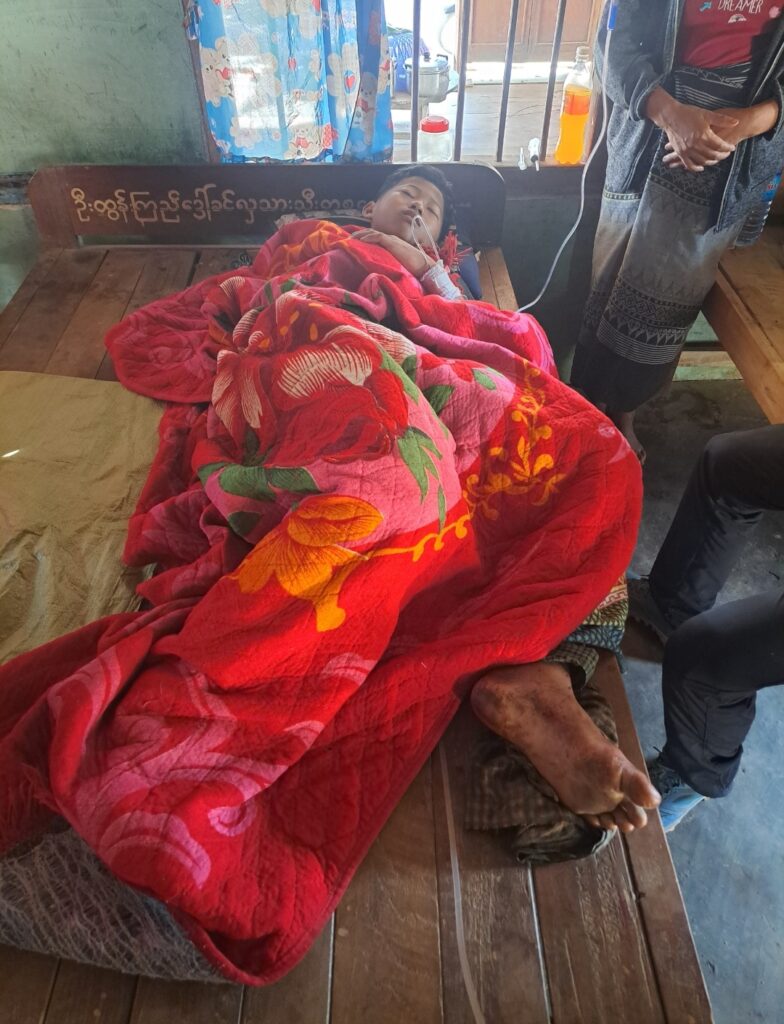
Utaing Shwe was going about his normal morning on 7 February 2024. His sons and their children lived in the two houses adjacent to his, the three houses forming an “L” shape. He was stoking the fire to prepare breakfast when he began to hear the first rifle cracks and artillery booms of the morning. Since the coup in February 2021, civil war had raged in his country. Utaing Shwe had gotten used to it, booms in the distance were part of a normal day. However today the fighting seemed nearer. Perhaps today wasn’t so normal.
In the early morning hours of 7 February, resistance soldiers of the Karen National Liberation Army (KNLA), People’s Defense Forces (PDF), and Bamar People’s Liberation Army (BPLA) began their assault on the Burma Army Light Infantry Battalion (LIB) 73 Camp. FBR teams had witnessed groups of resistance soldiers moving through the evening of 6 February to establish attack positions to the south of the camp. The camp is surrounded by rice fields, leaving little cover for the resistance forces.
Utaing Shwe reported that the volume of fire increased significantly around 8:00am. The Burma Army sent jet fighters and helicopters to reinforce LIB 73. Utaing Shwe gathered his wife, his daughter, his son in-law, his grandson (Kysaing Phyo), and his granddaughter under his house, using it as cover from the explosions and shrapnel of the airstrikes above. They decided to hide until the battle was done.
Jets continued to circle throughout the day, bombing indiscriminately in adjacent fields and inhabited villages alike. Their primary target seemed to be the town of Zayatyi to the west. That village’s downtown was leveled. The resistance soldiers, with their scraped-together weapons, could do nothing to stop the air strikes pounding the civilian homes.
Utaing Shwe reported that at one point during the day his son’s house was completely destroyed by an artillery round. His family continued to huddle together under his house, thankful they were spared. Later that day his other son’s house was partially destroyed. His house was the only one left standing.
The fighting began to dissipate by the afternoon. It seemed as if there was a lull, or perhaps maybe it was even over.
At about 4:30pm the FBR team was gathered to the south, planning relief efforts in response to the battle. Our team witnessed a helicopter approach from the north, hover over an undefined location, and then heard three loud booms.
As Utaing Shwe and his family stayed in hiding under their house there was an explosion above them. The house had been hit. The whole world seemed to shake for a moment and he was blinded by dust and smoke. As the dust cleared, he checked on his family. His granddaughter had shrapnel in her arm, but could walk. His wife had been hit by shrapnel in her lower back and buttocks. She would need to be carried. His grandson, Kysaing Phyo, had been hit in the inner thigh and was bleeding profusely. He couldn’t walk and was bleeding profusely. They needed to get help.
Utaing Shwe, his daughter, and her husband, managed to carry and drag their family to their motorbikes, one of which had a cart connected to it. Those who couldn’t walk were placed in the cart. The others rode. They began to make their way south, away from the fighting and headed towards our FBR medics and team.
Around 6pm they found us; we had already met up with another family whose teenage daughter was hemorrhaging from shrapnel wounds to her abdomen. Sadly, the teenage girl was pronounced dead after FBR medics spent 10 minutes trying to revive her. She had stopped bleeding even before she arrived. Our team did everything they could but she was too far gone. Her family mourned on one end of the tarp as the medics switched their focus to Kysaing Phyo’s leg.
They discovered that Kysaing Phyo had a piece of shrapnel near his femoral artery. Utaing Shwe and his family watched, worried, as the medics tried to stop the bleeding. Our team was able to stop the bleeding temporarily but Kysaing Phyo would need more intensive care to remove the shrapnel and stop the bleeding for good. The medics cleaned the wounds of the granddaughter and grandmother and once they were all stabilized, some of the team helped transport them to a clinic, while the medics stayed at their makeshift clinic.
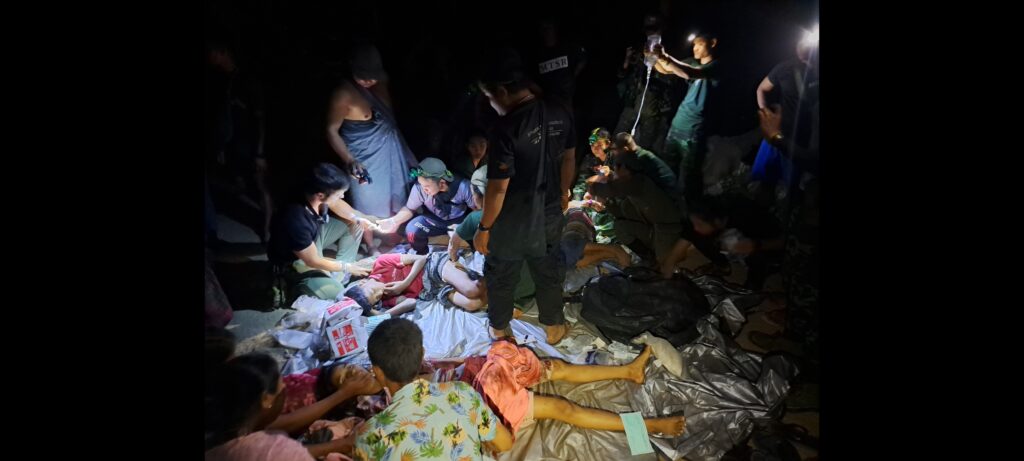
The medics at the local clinic worked to remove the shrapnel from the boy’s thigh. As it was removed, he began to hemorrhage again. Kysaing Phyo would need a blood transfusion. Seven Rangers were matches and volunteered to donate blood over the next two hours. Rangers prayed for the medical staff and the boy and his family. The doctor asked one Ranger, “Please pray to your God for this boy. Only He can save him.” We prayed in Jesus’ name for the bleeding to stop and for the boy to be healed.
Our team’s medics, alerted of Kysaing Phyo’s condition, arrived at the clinic around 11pm. When they arrived blood was everywhere. Five people were working on the boy. His father nervously held his leg straight so that he couldn’t kick off the table in his pain. His mother held his head, gently dabbing his lips with water and stroking his face. Others were managing IVs and the blood transfusion. Some were trying to put pressure on the wound to stop the bleeding.
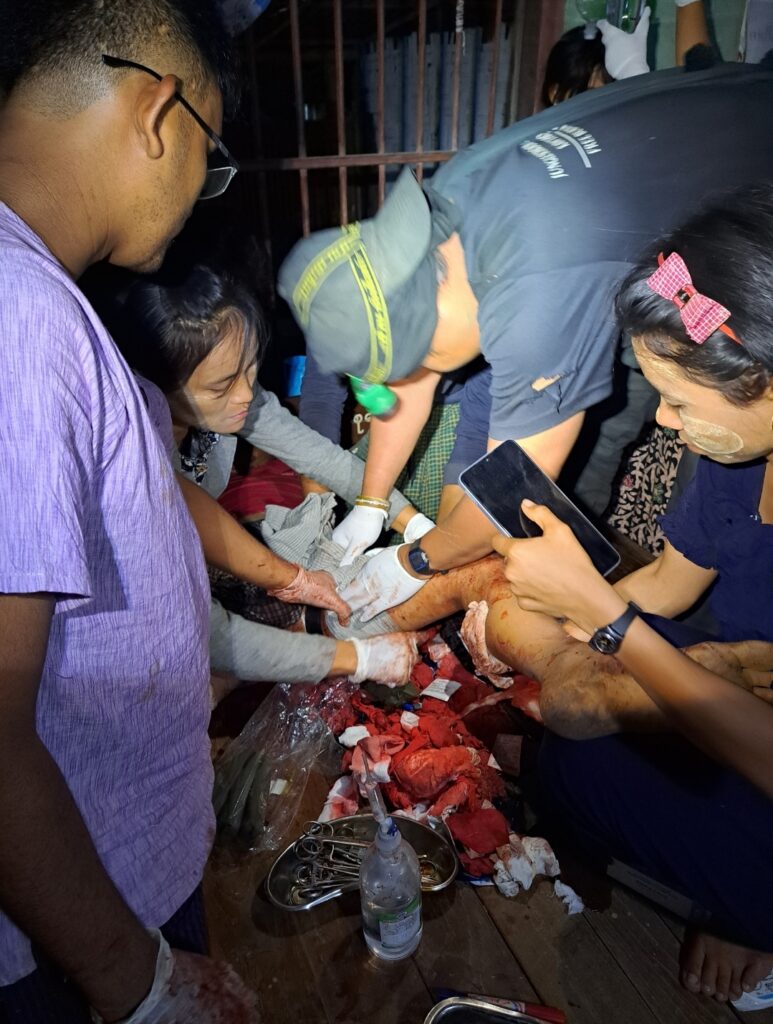
The Ranger medics applied a new tourniquet, packed the wound again with quick clot gauze, and applied a basic Israeli bandage from their Individual First Aid Kit (IFAK). Within minutes they had brought the bleeding under control. What an amazing answer to prayer!
The doctor called another Civil Disobedience Movement (CDM) doctor from a neighboring village. Now that the bleeding was under control they planned to amputate the leg. Two Rangers helped to carry the boy to the van; the operating clinic was 20 minutes away. Hearts were heavy as the Rangers hugged the parents and prayed for them as they climbed into the car with their son. Even if he survived he would likely live without a leg.
When the Rangers got back to camp in the early hours of the morning they prayed in Jesus’ name for the medical staff, the boy, and the family. “Please Jesus, let us see this boy alive tomorrow!”
The next day, 8 February, a small team decided to make rounds and visit the local clinics to pray for the staff and patients. Upon arriving at the first clinic our hearts jumped for joy at seeing the boy and his whole family. Kysaing Phyo wasn’t just alive, he also still had his leg! Praise God! The grandmother who had taken shrapnel in her side and buttocks was stable and talking. The granddaughter was walking around with some bandages on her arms. The parents were by the side of their son. The pain and panic of the night before was fading into smiles and relief.
The first thing the doctor said was, “The boy needed seven units of blood last night. Without the blood the Rangers donated he would not have made it.” Praise Jesus! This victory was His, working through so many. He used plans approved and developed by leaders of FBR to get the medics to where they were needed. He used the skills of our medics and the local medical staff to save Kysaing Phyo’s life. He used the medical supplies bought with funds donated by supporters to stop the bleeding. And He even used cameras and writers to get this story to you. Praise Jesus that He gives us all a place in His redemptive work.
Finally, he used the blood of the Rangers, maybe the most precious thing they could give, to sustain the boy’s life. The blood given by the Rangers is a wonderful reminder of a truth that bridges this world into the next. It’s a truth as old as time yet never loses its power. We had sung about this truth together in Karen and English two Sundays before at a church service: “What can make me whole again? Nothing but the blood of Jesus.” This wholeness is in every form – mind, spirit, and body. We pray that Jesus’ blood brings wholeness to these communities and to us.
Each day we had prayed to be in the right place, at the right time, with the right people. Jesus answered that prayer the night Utaing Shwe and his family rode into our camp. And praise God that Utaing Shwe’s story is just one example of many. To God be all the glory!
Thank you for your continued support in every way: prayer, supplies, encouragement, and beyond! Jesus is with you!
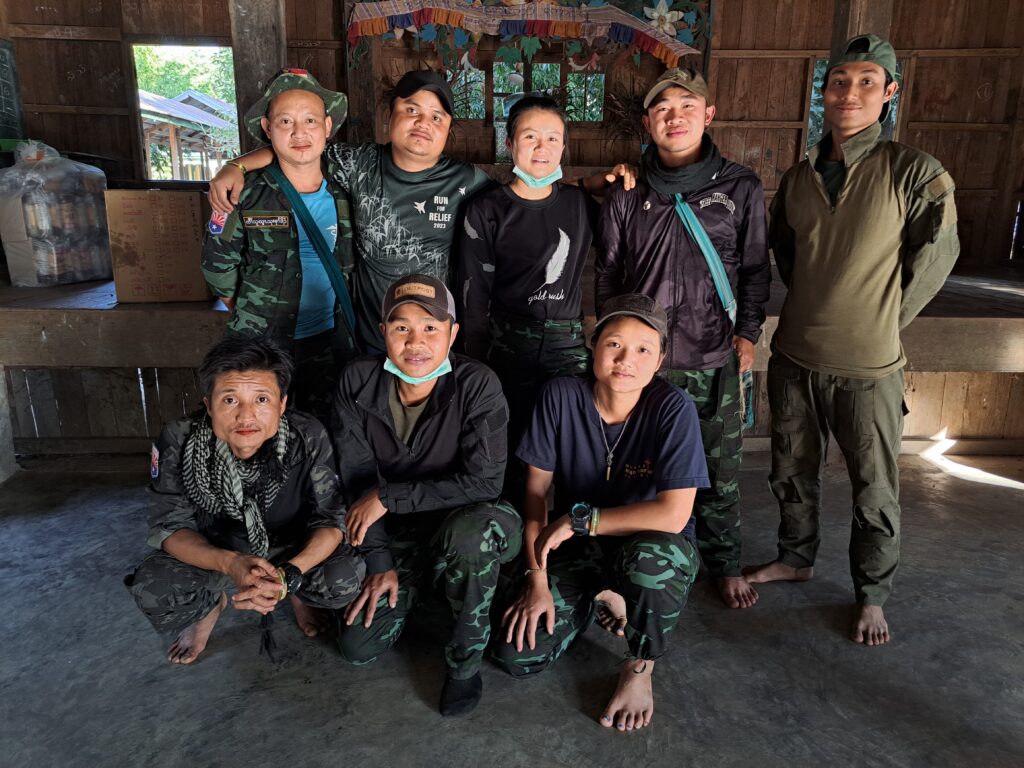
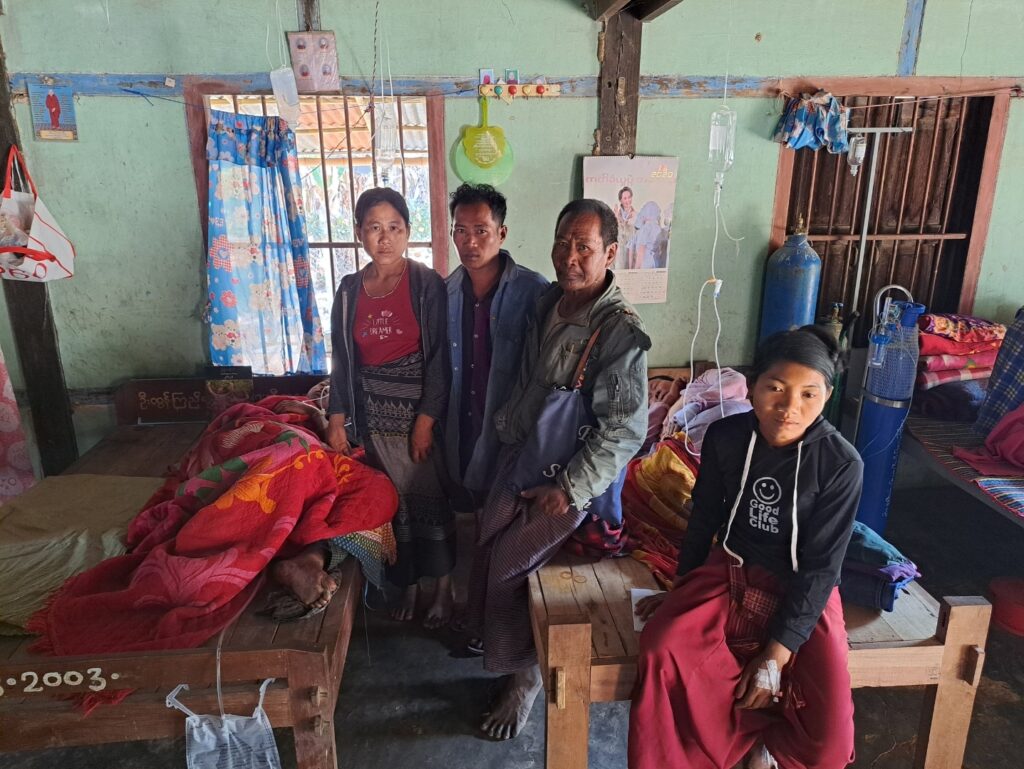
This story occurred during a month-long mission conducted by Ranger teams from multiple regions of Karen State. The mission included the following:
35 villages and communities in Karen State were helped and 16 group presentations of the Gospel were made.
8 medical clinics were hosted treating 1,109 patients who don’t have easy access to medical care.
10 Good Life Club programs were hosted to give hope to children and families in the midst of the war.
601 people displaced from their homes because of the conflict were helped with money, supplies, and medical care.
